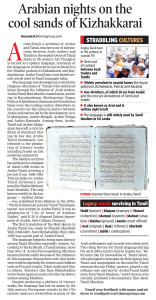Imposing other languages in the Dravidian land has always invited resistance and the recent controversy over Sankrit week celebration also drew severe criticism from political circles in the state. However, historically, Tamils were open to cultural interaction with other languages and there by enriching its own history and culture. Arabu-Tamil, a synthesis of Arabic and Tamil, was one such language which was born out of cultural interaction between Arab traders and native Tamils on the coastal towns of Tamil Nadu way back in 7th century AD.
Though it is extinct as a spoken language, the remnants of the language in written forms still can be traced to a few Muslim pockets in Kizha kkarai and Kayalpattinam.
kkarai and Kayalpattinam.
The language was developed as a vehicle for transferring religious education from the Arab Muslim traders to the native Tamils who embraced Islam through the influence of Arabs. The language flourished in coastal areas, including Kayalpattinam, Muthupettai, Nagur, Pulicat, Kizhakkarai, Ramnad and Karaikal as these were the centres where Arab traders came in close contact with native Tamils. Unlike in the north, Islam spread in the south through peaceful interaction between Arab traders and native Tamils and Arabu-Tamil served as vehicle of transformation of culture between two great civilisations. Elsewhere also the cultural contact between Arabs and natives of Indians led to the development of languages such as Arabi-Malayalam, Arabic-Bengali, Arabic-Telugu and Arabic-Kannada. Among them, Arabu-Tamil and Arabic-Malayalam have left a rich tradition of literature.
During the heydays, Arabu-Tamil immensely contributed to the production of literary works including books on law, medicine and poetry.
The Madras archives has prepared a catalogue mentioning books and authors of about 3,000 works in Arabu Tamil covering a period from 1890-1920 which include an Arabu-Tamil dictionary prepared by Hakim Muhammad Abudulla. The only known weekly published in the language – Ajaibul Akbar- was published from Madras in 1870s. “The first historical novel in Tamil ‘Tamirapattanam’ was written in Arabu-Tamil script. It was an adaptation of ‘City of brass’ of Arabian Nights,” said Dr KM A Ahamad Zubair, department of Arabic, New College, Chennai.
According to MA Aziz, a Sri Lankan scholar, of the 15,000 books kept in India Office Library London, about 60 are in Arabu-Tamil which include Nondi Nadagam (1872) and Sira Nadagam (1878).
The first translation of the Holy Quran in Arabu- Tamil was written by Shaykh Musthafa Wali (1836-1887). Sam Shihabuddin Wali (1634-1709) was a great poet of Arabu Tamil.
Interestingly, the language helped to bring mass literacy among Tamil Muslims especially Muslim women. According to Tayka Shaib, a Tamil scholar, more than 80% of Arabu-Tamil speaking Mulisms became literate solely because of the influence of this language. Researchers note that there were books written especially for women and children such as Pen putti malai, Tokai malai and Simtu sibyan. Scholars like Sam Shihabudhin even wrote books against social evils like dowry system among Muslims.
After producing a plethora for literary works, mostly religious, by 19th century the language gradually lost its steam due to various reasons. The onslaught of Portuguese against the Arab traders in 17th century came as a severe blow to the language as many of Arab settlements and records were destroyed in these attacks. Though Hafiz Amir Wali, a great scholar from Kayalpattinam tried to re-introduce the language it could not sustain for a long.
The de-Sanskritisation and the pro-Tamil movements of the early 20th century had also its impact on the Tamil Muslims. “Reformers like Pa Dawoodsha, of ‘Darul Islam’, who attempted to translate the Holy Quran into Tamil and campaigned on the need of Tamil sermons during the Friday prayers, played a significant role and slowly Arabic Tamil faded away from the Tamil Muslims,” said S Anwar, who recently produced a documentary film of Tamil Muslims.
Tags: Arabu Tamil, Kayalpattinam, Kizhakkarai, Tamil Muslims